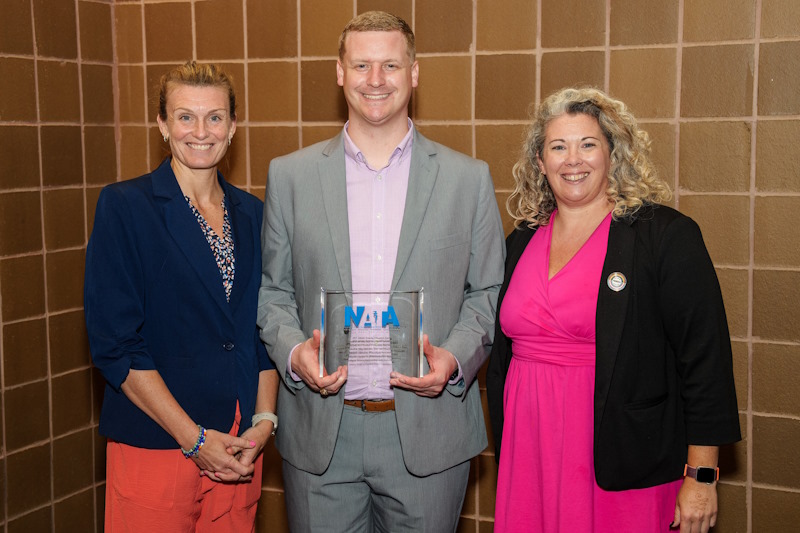July 22, 2024 | Erin Bluvas, [email protected]
Papers published by researchers in the Department of Exercise Science have been selected as the nationwide winners of outstanding manuscript awards from two major athletic training journals. They were recognized at the National Athletic Trainers’ Association’s Annual Convention last month.
Alumni Kaitlynn Moll (M.S. in Advanced Athletic Training ’23) and Nancy Uriegas (Ph.D. in Exercise Science, ’24) and clinical assistant professor Zachary Winkelmann won the Athletic Training Education Journal Award for the Outstanding Manuscript for their paper on the use of a social determinants of health history focused script to facilitate patient conversations. Ph.D. in Exercise Science alumni Jacob Kay (’20) and Adam Harrison (’22 and currently a postdoctoral fellow) and exercise science associate professors Toni Torres-McGehee and Davis Moore won the Journal of Athletic Training Kenneth L. Knight Award for the Outstanding Research Manuscript for their paper on the connection between concussions and suicide, which was featured in a special edition of the journal.
“The JAT and ATEJ are the flagship journals for athletic training clinical practice and education,” Winkelmann says. “These awards highlight the contributions of research to ultimately improve patient care.”

Prior research has demonstrated the importance of identifying social determinants of health to overcome barriers to positive health outcomes and address access limitations to resources that facilitate patient-centered care. Yet, screening for these factors is not always a part of standard care – particularly due to the absence of an effective tool to navigate this process.
In their exploration of using a focused history script as an aid to collecting information about social determinants of health, the authors for the winning paper in the Athletic Training Education Journal found that using this type of screening tool helped facilitate conversations between athletic training students and patients. Further, most health care students that were not required to use the script as a screening tool failed to elicit information about social determinants of health from their patients.

In response to growing interest in the relationship between multiple concussions and mental health, the authors of the Journal of Athletic Training award-winning paper investigated the association between concussion frequency and adverse mental health outcomes among male and female youth.
The researchers found that high school students who reported concussion/s were more likely to experience poor mental health and suicidal behaviors. Further, the more concussions experienced by these adolescents, the greater the odds of reporting suicidal attempts (particularly among males). These results suggest a need for careful monitoring by health care professionals of youth who experience repeated concussions, especially those in the close proximity to one another.
“The intersection of these topics with clinical outcomes has been pivotal,” Winkelmann says. “Understanding how mental health, specifically suicidal ideation, may be impacted by concussions, as well as how we can explore constructs of patient-centered care, such as the social determinants of health, is critical to the ever-changing landscape of sports medicine.”